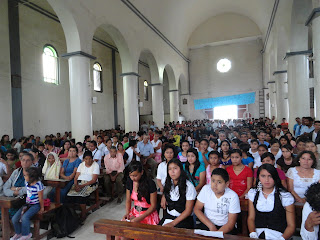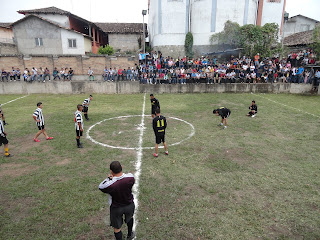As the east coast of the United States faces the fury of
Hurricane Sandy and as Honduras faces the ongoing fury of violence and
corruption, I recall an image of Jesus calming the waters (Mark 4:35-40).
Years ago a Belgian priest friend of mine sent me a card
with a photo of this scene from a miniature in a medieval manuscript.
It came at a good time in my life, helping me to navigate
troubled waters.
What surprised me about the miniature was that Jesus is
depicted twice. On the left he is sleeping during the storm and Peter is trying
to wake him up. On the right, he is blessing and calming the waves – as two
fish fly in the air.
Jesus is with us in the storm, whether or not we feel his
presence, whether the storm is still raging or the seas are calmed.
His presence can sustain us, not necessarily changing what
is troubling. His presence can give us the peace that prevents our
disintegration, the deep peace and consolation that defies what threatens us.
There is a passage from Being
Peace by the Vietnamese Buddhist Monk Thich Nhat Hanh that comes to mind:
Many of us worry about the situation of the world. We don't know when the bombs will explode. We feel that we are on the edge of time. As individuals, we feel helpless, despairing. The situation is so dangerous, injustice is so widespread, the danger is close. In this kind of a situation, if we panic, things will only become worse. We need to remain calm, to see clearly. Meditation is to be aware, and to try to help.I like to use the example of a small boat crossing the Gulf of Siam. In Vietnam, there are many people, called boat people, who leave the country in small boats. Often the boats are caught in rough seas or storms, the people may panic, and boats may sink. But if even one person aboard can remain calm, lucid, knowing what to do and what not to do, he or she can help the boat survive. His or her expression - face, voice - communicates clarity and calmness, and people have trust in that person. They will listen to what he or she says. One such person can save the lives of many.Our world is something like a small boat. Compared with the cosmos, our planet is a very small boat. We are about to panic because our situation is no better than the situation of the small boat in the sea. You know that we have more than 50,000 nuclear weapons. Humankind has become a very dangerous species. We need people who can sit still and be able to smile, who can walk peacefully. We need people like that in order to save us. Mahayana Buddhism says that you are that person, that each of you is that person.
Followers of Christ should also be those persons of calm and
tranquility, the peacemakers who by their presence give others the courage the
face the storms – physical, emotional, and spiritual.
And so, in the midst of the storms, let us look to Christ,
keeping our eyes on Him who brings us calm in the midst of the storm so we can
also bring others peace.




















